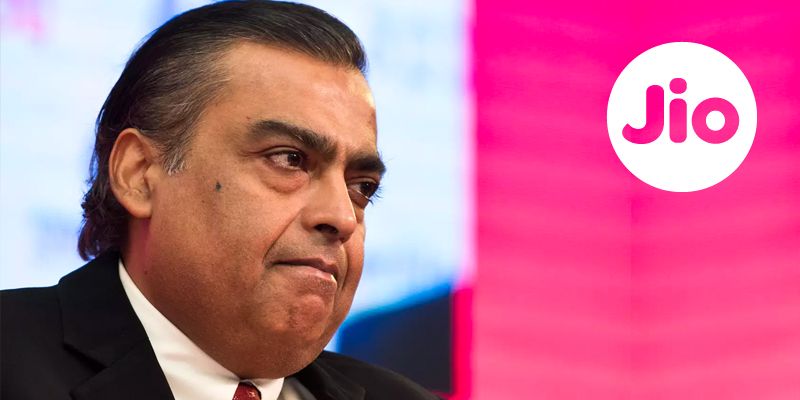Inside Jio’s billion-dollar deals: Why investors are flocking to Mukesh Ambani's $65B internet biz
Jio grew from a telecom network to a diversified digital ecosystem in four years. Now, global investors are flocking to it before Reliance takes it public in the next 12 to 24 months.
Reliance Jio has been one of the most talked-about companies lately. Even as India’s economy faces its worst slowdown in 30 years, and industries reel under the coronavirus crisis, Jio has attracted a slew of global investors and got them to cut billion-dollar cheques.
To understand Jio’s ambitions, one has to trace back to its telecom beginnings, and know that it was never about data or mobile telephony alone. But that’s where it all began.
When Jio launched in September 2016 with a deluge of ‘free and unlimited’ offers, telecom companies sat up and took notice. While many hailed Mukesh Ambani’s vision for a truly Digital India, some even jeered at him.
Given Reliance’s track record in telecom, many believed that Jio was just an ego exercise for Ambani, and its hype would fizzle out as soon as it started charging its customers. Several bets were placed on Jio’s potential conversion rates: how many freeloaders could Reliance turn into paid users?
In July 2017, after more than three quarters of offering free 4G data, Reliance launched Jio’s first paid plan at its 40th AGM in Mumbai, where the company is headquartered.

Photo: YS Design
By then, Jio had accumulated 108 million users, of which 72 million were paying subscribers, availing the annual Jio Prime membership for Rs 99. It had also become the world’s fastest-growing telecom network.
But despite its roaring popularity, Ambani knew he had to soften the blow when he would finally ask Jio’s free users to start paying. He declared that Jio would offer the world’s cheapest mobile data, with 1GB costing just Rs 11, less than a vada pav – a popular street food in Mumbai. The analogy hit home.
Before this, the average cost of 1GB data in India was Rs 225. Rival telcos cried foul and accused Jio of predatory pricing. But soon, even they were compelled to launch cheaper data plans leading to a cut-throat tariff war. Jio had ushered in a 'data revolution' in India, the ripple effects of which were to be felt far and wide.
Reliance gradually upped Jio tariffs between 2017 and 2020, but India continues to have the cheapest mobile data in the world. At present, 1GB data costs Rs 18 ($0.26) on an average. And, Jio is the country's largest telco with 388 million subscribers.

Telco to digital ecosystem player
RIL’s ambitions for Jio were always broader and deeper than what meets the eye. “They always wanted to take Jio beyond connectivity. It was a data, technology, and ecosystem opportunity. Connectivity was just the lubricant,” Sanchit Vir Gogia, Founder and CEO, Greyhound Research tells YourStory.
Gogia, who’s tracked Jio’s journey since inception, elaborates,
“RIL had good foresight, and they knew that to be able to do more with their physical assets, they had to first expose customers online. People were not online because data was very expensive. So, Jio’s plan was to democratise data, get tonnes of people on its network, and then sell them its other services.”
Essentially, Jio wanted to own the pipe (data) and everything (products and services) that flows through it. “They spent four years in building an ecosystem under Jio. Some they created in-house, some they acquired. It was all interconnected and part of a larger plan,” Gogia adds.

RIL Chairman Mukesh Ambani with son and Reliance Jio Director Akash Ambani
And, it worked. A Bank of America Securities survey confirms that Jio has helped improve brand recall and perception for RIL’s other consumer services.
The conglomerate’s notable acquisitions in the technology space include Saavn (music streaming), Haptik (conversational AI), Embibe (learning and edtech), Reverie (Indic language software), NowFloats (SaaS for SMEs), Den Networks and Hathway (cable and broadband), Radisys (5G and IoT), and more.
In three years, RIL spent $3 billion in acquisitions across verticals, according to Morgan Stanley Research. “The acquisitions reflect its ambition to disrupt the consumer space through the use of technology,” it states.
Sometime in 2019, Ambani made it clear that Jio’s ambitions weren’t restricted to just telecom. It would be a multifold offering spanning across all segments of consumer tech — artificial intelligence (AI), internet of things (IoT), blockchain, online gaming, video streaming, multi-party videoconferencing, augmented reality (AR), virtual reality (VR) and mixed reality (MR), ecommerce, retail, health, etc.

Photo: YS Design
Ambani said, “To drive the next leg of growth, a truly transformational and disruptive digital services company has been set up, which will bring together India’s No 1 connectivity platform, leading digital app ecosystem, and the world’s best tech capabilities for creating a truly digital society for each Indian."
One glance through the app stores will reveal that there are more than 20 apps and services currently live under Jio, with many more under testing.
Tarun Pathak, Associate Director, Counterpoint Research tells YourStory,
“Jio is offering attractive connectivity pricing with a scale play. It is using the bundle of applications and services to lock the user into its ecosystem, which cuts across segments.”
Come 2020, and the billions of dollars RIL spent in building the Jio ecosystem and ‘locking’ millions of consumers would begin to bear fruit.
Why global investors are flocking to Jio
In the last few weeks, Jio Platforms, which includes RIL’s internet services, has attracted $10.5 billion in investments from top-tier global VCs and PEs, valuing the entity at over $65 billion. This is higher than the valuations of internet economy giants like Zoom ($42 billion), Uber ($35 billion), Twitter ($34 billion), and Airbnb ($26 billion).
Jio’s investors include Facebook ($5.7 billion), Silver Lake Partners ($747 million), Vista Equity Partners ($1.5 billion), General Atlantic ($870 million), and KKR’s Asia PE Fund ($1.5 billion). Reliance has diluted about 17.1 percent equity stake in Jio.
But it may not be done yet.
Industry insiders tell YourStory that Reliance is likely to ink “one or two more deals” as it looks to divest 20 percent in Jio to make it debt-free by the end of 2020. It could also be looking at an overseas IPO in the next 12 to 24 months, as per reports.
“Reliance would be looking at a $100 billion valuation for Jio,” an equity analyst told YourStory on the condition of anonymity, “It will also look to plug a few gaps like payments, digital wallets, and last-mile delivery (which is critical for its ecommerce ambitions) in the Jio ecosystem before going public.”

Photo: YS Design
The grapevine is abuzz that Microsoft and Saudi Arabia’s sovereign wealth fund might be looking to invest in Jio Platforms. Incidentally, Jio had struck a 10-year strategic deal with Microsoft in 2019 for building data centres to push India’s digital transformation.
But why are global investors making a beeline for Jio? More importantly, what does the company plan to gain through these multi-billion-dollar alliances?
Gogia explains, “The intent here is clearly three-fold: debt reduction and overall profitability; equity dilution at tech valuations; and sentiment uptick with global names. Jio Platforms should, in theory, get listed sooner than later – and that should dramatically change valuations.”
Investors, on the other hand, get a strong foothold in one of the largest consumer markets in the world through a truly diversified ecosystem. “They know that Jio is not a digital opportunity alone. It is a hybrid or phygital opportunity, where RIL will marry its prowess in online and offline domains. All their services are now getting tied more closely under Jio,” adds Gogia.
Leading VCs that have invested in Jio also come with decades of experience in scaling up tech-led businesses across the globe, and sometimes even helping them go public.
General Atlantic CEO Bill Ford says, “We have a long track record working alongside founders to scale disruptive businesses like Jio, which is at the forefront of the digital revolution in India. We share Mukesh’s conviction that digital connectivity has the potential to significantly accelerate the economy and drive growth across the country.”
Needless to say, Reliance has picked its partners well.
Facebook powering Jio’s ecommerce play
Out of all the recent investments in Jio, the Facebook partnership has caused quite a stir in the industry. The social media giant now owns nearly 10 percent of Jio Platforms, becoming its largest minority shareholder. The alliance is being closely watched for the massive impact it can potentially have on India’s consumer internet landscape.
“Our focus will be India's 60 million micro, small, and medium businesses, 120 million farmers, 30 million small merchants, and millions of small and medium enterprises in the informal sector,” Jio had said in the statement announcing the deal.
Some industry observers have called it “a dangerous alliance” and even cautioned other ecommerce operators about intensified competition. "Foreign players in these segments, including Amazon, Alibaba’s Paytm, and Walmart’s Flipkart, need to carefully watch this dangerous alliance,” Laura Petrone, Senior Analyst, GlobalData, said.

Within days of announcing the Facebook deal, Reliance launched its online-to-offline (O2O) commerce venture JioMart on WhatsApp, where users can place their orders online and complete the pick-up offline.
Facebook and Jio are said to be exploring a construct where consumers can browse the availability of local shops, get their queries answered, scan through products, and purchase them within WhatsApp. Reliance calls it the ‘new commerce’ model and has already roped in lakhs of kiranas. JioMart rolled out across 200 cities earlier this week.
Analyst Laura explains,
“The partnership between JioMart and WhatsApp, which has more than 400 million users in India, will give Facebook privileged access to India’s heavily regulated ecommerce and mobile payment sectors. It will also help it access the huge network of small convenience shops, which have delivered essential packages during COVID-19.”
Eventually, users would also be able to pay for their orders via WhatsApp Pay, which has been caught in regulatory hurdles in India. But Jio could become its launchpad.

“From sourcing to retail to customer acquisition, Jio wants economies of scale and control over the entire supply chain. The intent is to leverage tech to capitalise on assets across RIL companies,” says Gogia.
The FB-Jio partnership has naturally resurfaced conversations around net neutrality.
However, in a post-deal media call, Facebook India VP and MD Ajit Mohan clarified, “The construct of this collaboration is not meant to be exclusive. The platforms [WhatsApp, etc.] remain open... it is non-exclusive and it is not meant to keep anyone away.”
But JioMart is not just an opportunity for Facebook and Jio. It is believed to have a larger and enduring impact on India’s overall retail industry.
Counterpoint’s Tarun explains,
“JioMart will serve as a single platform for all big and small consumers, merchants, and traders while giving Jio a much larger bargaining power and control with FMCG firms. On a broader level, it will also have the capability to play a larger role in bringing great efficiency in India’s food production, demand, and consumption.”
Surely, Jio’s plans are grand and ambitious, and they are fuelled by a parent (RIL) whose market cap crossed Rs 10 lakh crore recently. It is also the most valued publicly listed company in India. Not to say that Jio would never fail.
But if there’s any internet business in India, which can burn and survive and eventually thrive, it is Jio. No wonder it has the world’s attention.
Edited by Saheli Sen Gupta









_(1)1565602090478.png?fm=png&auto=format&h=100&w=100&crop=entropy&fit=crop)









